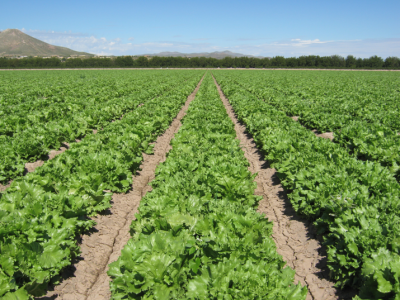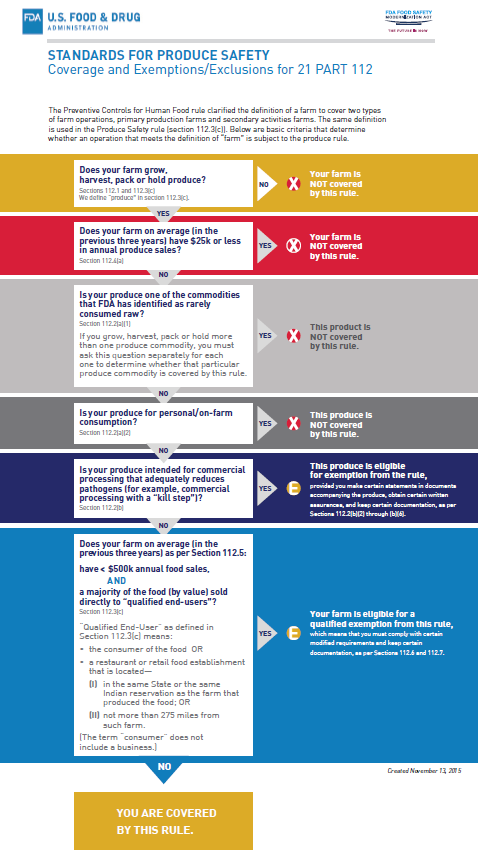What is FSMA?

The Food Safety Modernization Act, or FSMA, as it is more commonly known, is the foremost reform of the United States' food safety laws in over 70 years. FSMA directs the U.S. Food and Drug Administration (FDA) to ensure the U.S. food supply is safe by shifting focus from responding to foodborne outbreaks to implementing risk-based measures to prevent them. FSMA passed into law in 2011 and the FSMA Rules become effective on a timetable found on the FDA webpage. FSMA encompasses the seven Rules below that integrate preventative food safety measures into the entire U.S. food supply system. While the purpose of this webpage is to address the Produce Safety Rule, if you are interested in whether any of these other Rules apply to you, please click on the following links.
Seven FSMA Rules:
-
Preventive Controls for Human Food - Human Food
-
Preventive Controls for Animal Food - Animal Food
-
Foreign Supplier Verification Programs - Verification
-
Accreditation of Third-Party Auditors/Certification Bodies - Accreditation of Third Party
-
Sanitary Transportation of Human and Animal Food - Transportation of Food
-
Prevention of Intentional Contamination and Adulteration - Prevention of Contamination
-
Produce Safety Rule - Produce Safety Rule
Update
FDA Food Safety Modernization Act (FSMA) https://www.fda.gov/fsma FDA Publishes Final Rule Extending Compliance Dates for Agricultural Water Provisions
March 15, 2019
Today, the U.S. Food and Drug Administration issued a rule to finalize the new compliance dates for the agricultural water requirements in the FDA Food Safety Modernization Act (FSMA) Produce Safety Rule.
Larger farms are now required to comply with the agricultural water requirements by January 26, 2022, while small farms have until January 26, 2023 and very small farms until January 26, 2024. This rule does not change the compliance dates for sprout operations.
These compliance dates have been extended while the FDA considers how best to protect public health while addressing widespread concerns about the complexity of the agricultural water requirements and the practicality of implementing them across a wide variety of farms, water sources and uses. The FDA intends to use this time to work with stakeholders to address these concerns.
While this rule extends the compliance dates for the agricultural water provisions, produce remains subject to the other provisions of the Produce Safety Rule and the adulteration provisions of the Federal Food, Drug and Cosmetic Act (FD&C Act).
For More Information: • Constituent Update • Final Rule: Standards for Growing, Harvesting, Packing and Holding of Produce for Human Consumption; Extension of Compliance Dates for Subpart • FSMA Final Rule on Produce Safety
What Is the Produce Safety Rule?
The Produce Safety Rule is the first mandatory federal standard for the production, harvest, and handling of fruits and vegetables in the U.S. in an effort to prevent foodborne illnesses associated microbial contamination of fresh commodities that are typically eaten raw. Typical commodities grown in New Mexico that would be covered by the Rule include lettuce, cabbage, chile, onions, melons, apples, peaches, pistachios, and pecans. The full list of commodities that are covered by the Rule.
Does the Produce Safety Rule Apply to Me?
Follow the instructions in the table below to find out if the Produce Rule applies to you.

How Does the Produce Safety Rule Apply To Me?
Attend a Produce Safety Alliance (PSA) Grower Training
Follow this website for updates by FDA to the Produce Safety Rule
Who Should Attend PSA Grower Training?
Fruit and vegetable growers and others interested in learning about produce safety, the Food Safety Modernization Act (FSMA) Produce Safety Rule, Good Agricultural Practices (GAPs), and co-management of natural resources and food safety practices.
The PSA Grower Training Course is one way to satisfy the FSMA Produce Safety Rule requirement outlined in § 112.22(c) that requires 'At least one supervisor or responsible party for your farm must have successfully completed food safety training at least equivalent to that received under standardized curriculum recognized as adequate by the Food and Drug Administration.'
What to Expect at the PSA Training Course?
The trainers will spend approximately seven hours of instruction time covering content contained in these seven modules:
Module 1: Introduction to Produce Safety
Module 2: Worker Health, Hygiene, and Training
Module 3: Soil Amendments
Module 4: Wildlife, Domesticated Animals, and Land Use
Module 5-1: Agricultural Water Part I: Production Water
Module 5-2: Agricultural Water Part II: Postharvest Water
Module 6: Postharvest Handling and Sanitation
Module 7: How to Develop a Farm Food Safety Plan
In addition to learning about produce safety practices, key parts of the Produce Safety Rule requirements are outlined within each module. There will be time for questions and discussion, so participants should come prepared to share their experiences and ask questions.
For upcoming PSA grower training's see Upcoming PSA Grower Training's in New Mexico Tab
Benefits of Attending the Course?
After attending the entire course, participants will be eligible to receive a certificate from the Association of Food and Drug Officials (AFDO) that verifies they have completed the training course. To receive an AFDO certificate, a participant must be present for the entire training and submit the appropriate paperwork to their trainer at the end of the course.
Compliance Dates
Information about compliance dates for the FSMA Produce Safety Rule is summarized in the following table where you can see the specific regulatory compliance dates for the different parts of the Rule.

Footnotes to picture above.
1) According to the Proposed Rule, issued on 9/13/17, Compliance dates for Subpart E, Agricultural Water, allow an additional four years.
2) A farm eligible for a qualified exemption must notify consumers as to the complete business address of the farm where the food is grown, harvested, packed, and held.
3) A farm is a small business if, on a rolling basis, the average annual monetary value of produce sold during the previous 3-year period is no more than $500,000. 4 A farm is a very small business if, on a rolling basis, the average annual monetary value of produce sold during the previous 3-year period is no more than $250,000.
Implementing FSMA in New Mexico
In New Mexico, New Mexico Department of Agriculture (NMDA) will be the regulatory agency overseeing the implementation of the regulations. For additional information, visit the NMDA website. The NMSU-CES offers PSA Grower Training and On-the-Farm-Readiness-Review to producers in the state. See Upcoming Grower Trainings in New Mexico on the tab listed.
How Do I Get More Information About the FSMA Produce Safety Rule?
There are a number of ways you can stay up-to-date with regulation.
Sign up for the PSA General List. We send updates as we receive new information on the regulation, as well as educational opportunities and other produce safety information. Sign Up for Local Information.
Attend a training. Sign up for the PSA listserv for the latest information on when training is available.
Sign up for the FDA's E-mail Updates.